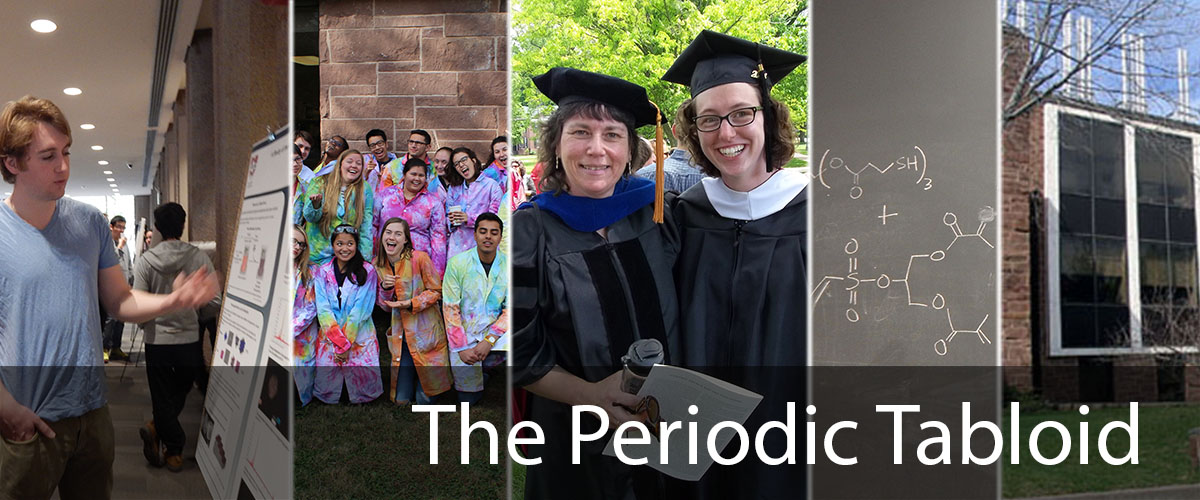Associate Professor of Chemistry Erika Taylor writes in The Conversation about sugars expressed on the surface of E. coli and how they determine whether the bacterium is a pathogenic or not.
David McCamant (’95) receives teaching and mentorship award
David McCamant, an alum of the Class of ’95, has received the very first College Award for Undergraduate Teaching and Research Mentorship from the University of Rochester, where he is Associate Professor of Chemistry. He notes that “his goal is pass along to students the same excitement he felt as a chemistry undergraduate at Wesleyan University.” You can read the full story at the link below. Congratulations Prof. McCamant!
Chemistry majors present at conference
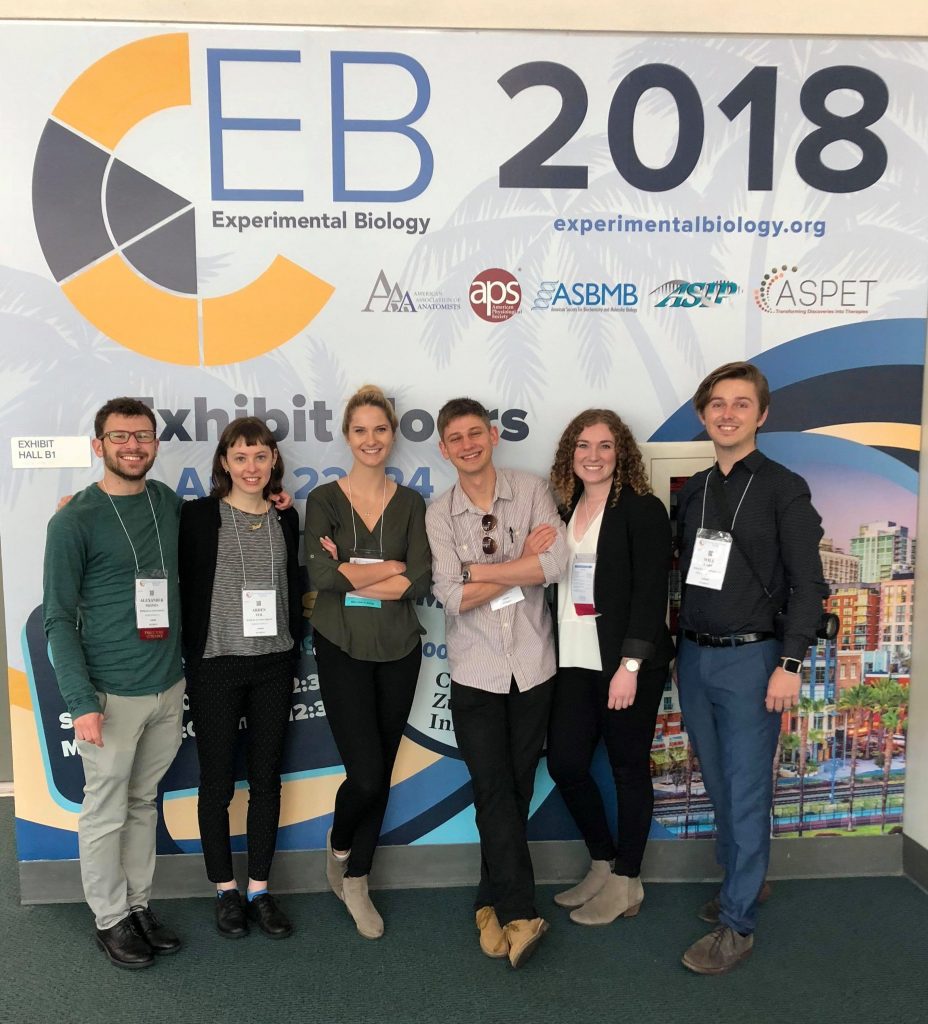
Chemistry majors Christine Little, Emily Kessler, and Cody Hecht, along with three MB&B majors, attended the annual Experimental Biology (EB) conference in San Diego in mid-April. All three were invited as members of the American Society of Biochemistry and Molecular Biology (ASBMB), a participating society of EB. At the meeting, Christine, Emily, and Cody each competed in an undergraduate poster competition (in which Christine was awarded an honorable mention for an exceptional poster!) and presented their posters in sessions according to their area of research.
Christine’s project in Ishita Mukerji’s lab focuses on characterizing the binding interactions of yeast histone H1 to DNA four-way junctions. Cody’s research in Erika Taylor’s lab investigates the protein dynamics of Heptosyltransferase I as part of ongoing inhibitor design efforts. Emily’s work in Manju Hingorani’s lab concentrates on the link between mutations in DNA mismatch repair protein MutS and Lynch Syndrome.
Seniors Elected to Phi Beta Kappa
Five senior chemistry majors have been elected to the Gamma Chapter of Phi Beta Kappa. They will be honored at an induction ceremony on Saturday, May 26, 2018 at 4:00 p.m. in the Chapel. The honorees are:
- Max Distler
- Kenneth (Cody) Hecht
- Joanna Korpanty
- Carlo Medina
- Daniel Robertson
They join Maya Marshall and Aaron Stone, who were elected in the fall semester. This has been a banner year for chemistry students and we proudly extend our congratulations to all.
Personick group presentations at ACS meeting
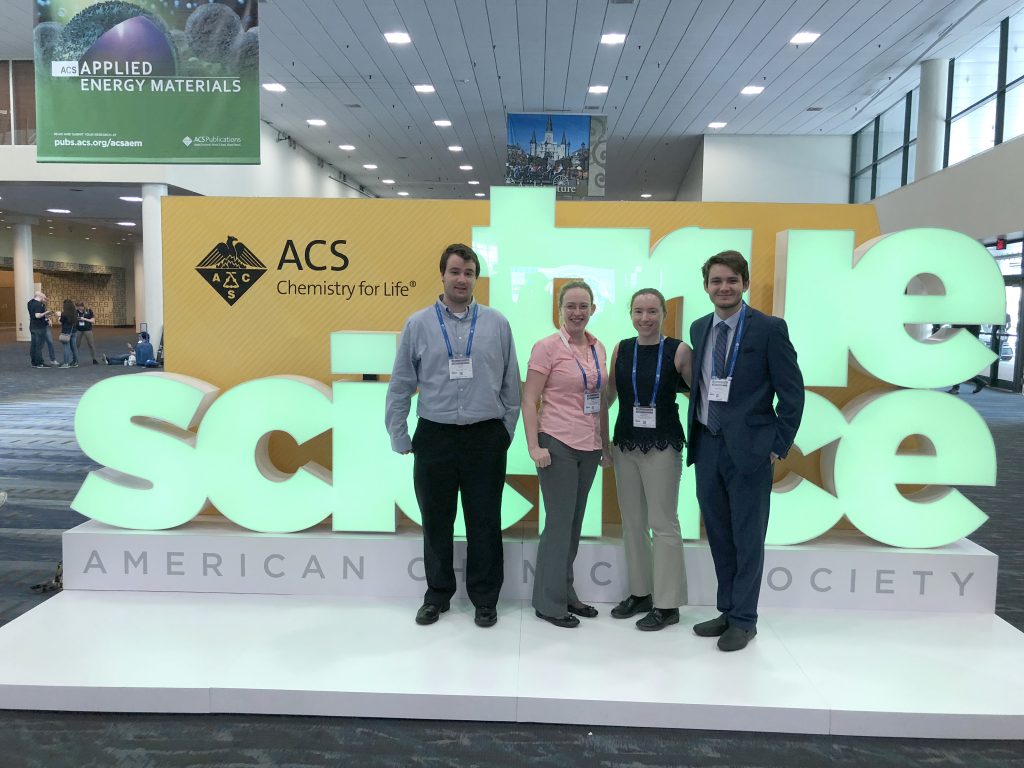
Members of the Personick research group (left to right: David Solti ’18, Melissa King (grad), Prof. Personick, and Danny Robertson ’18) attended the American Chemical Society Spring National Meeting in New Orleans, LA from March 18-22, 2018. Danny gave a talk on Sunday on “(Ag)Au concave cubes as experimental models of computationally predicted active sites for the oxygen-assisted coupling of alcohols.” Melissa presented on Wednesday about her work on “Coupling competitive surface interactions: a synthetic route to enhanced grain boundaries at the exterior of multiply twinned palladium nanoparticles.” On Thursday, Prof. Personick presented the group’s recently published research regarding “Approaches for bridging dissimilar reduction kinetics in the synthesis of bimetallic nanomaterials.” All of the talks were well received by their respective audiences.
In addition to presenting their research, the Wesleyan contingent also recruited prospective graduate students for the Wesleyan PhD program at the graduate school recruiting fair, and Melissa was invited to participate in a panel on “Graduate School: The In’s and Out’s of Getting In” which was very highly attended. Prof. Personick caught up with Wesleyan alum Prof. John Keith (Univ. of Pittsburgh) over breakfast, and everyone spent time sampling the local cuisine.
Daniel Robertson (’18) receives travel award from American Chemical Society
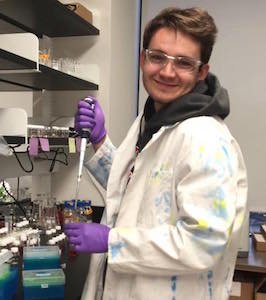 Daniel Robertson, a senior chemistry major, has been awarded a travel grant from the Division of Inorganic Chemistry of the American Chemical Society (ACS). The grant will help defray the costs for him to attend the 255th National Meeting of the ACS, where he will be presenting on his recent research in Prof. Michelle Personick’s lab. His talk is titled “(Ag)Au concave cubes as experimental models of computationally predicted active sites for the oxygen-assisted coupling of alcohols”. The selection criterion for this competitive award is the scientific merit of the work being presented. The meeting will be in New Orleans during the second week of the Wesleyan spring break. If you are attending the meeting, Danny’s talk is scheduled for Sunday, March 18 at 8:50 a.m. in room 212 of the Convention Center. He and Prof. Personick would be delighted to have you there.
Daniel Robertson, a senior chemistry major, has been awarded a travel grant from the Division of Inorganic Chemistry of the American Chemical Society (ACS). The grant will help defray the costs for him to attend the 255th National Meeting of the ACS, where he will be presenting on his recent research in Prof. Michelle Personick’s lab. His talk is titled “(Ag)Au concave cubes as experimental models of computationally predicted active sites for the oxygen-assisted coupling of alcohols”. The selection criterion for this competitive award is the scientific merit of the work being presented. The meeting will be in New Orleans during the second week of the Wesleyan spring break. If you are attending the meeting, Danny’s talk is scheduled for Sunday, March 18 at 8:50 a.m. in room 212 of the Convention Center. He and Prof. Personick would be delighted to have you there.
Joy Cote receives PhD
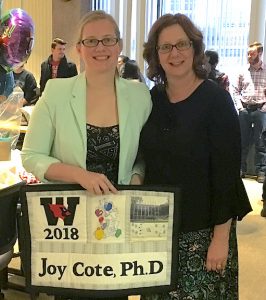
Meet Joy Cote, a recent PhD student who graduated from the chemistry department in January. Joy came to Wesleyan after receiving her BS in chemistry from the College of Mount Saint Vincent in 2012. During her time as an undergraduate, Joy participated in two separate research projects. Both a synthetic project aiming to create porphyrins and a development project aiming to understand sperm development in Drosophila. Although both projects nurtured her scientific aspirations, she was not completely satisfied with either of them. Upon coming to Wesleyan, Joy joined Prof. Erika Taylor’s lab and spent the next 5 years investigating the dynamics of Heptosyltransferase I, an enzyme found in Gram-negative bacteria, using a variety of biophysical techniques. It was during this time that she realized that research focused on understanding proteins in a quantitative manner was something she was passionate about and would drive her future studies. Since graduating, Joy has started a post-doctoral associate position at Fox Chase Cancer Center. Here she is working with Dr. Andy Andrews on how acetylation of metabolic enzymes that play a role in regulation.
Chemistry Department Welcomes Prof. Colin Smith
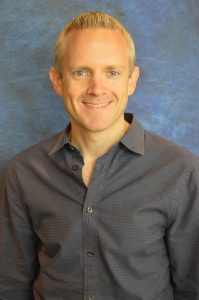
The Chemistry Department welcomes Professor Colin Smith to the faculty where he also holds an affiliated appointment in the Molecular Biophysics Program. He earned his BA from New York University and a PhD from the University of California San Francisco, where his research focused on protein design and developing new methods for computationally modeling protein flexibility. Prior to coming to Wesleyan, he was a postdoctoral scholar at the Max Plank Institute for Biophysical Chemistry in Göttingen. There he studied protein motion at the atomic level and its implications for how biological activity is regulated.
At Wesleyan Prof. Smith will continue his work in protein dynamics, with a focus on determining the atomic-level mechanisms of how changes in regions far from the active site propagate through proteins and ultimately affect their functions. For example, some remote mutations can cause proteins to malfunction and lead to disease. In other cases, protein engineering has discovered unusually located mutations that enhance activity, making new synthetic and therapeutic applications possible. Work by Prof. Smith and others has identified an increasing number of cases where this communication happens not through a change in the structure, but in the extent of protein motion.
Prof. Smith and his students will take a distinctly multidisciplinary approach, including computational simulation and modeling, in addition to high-resolution biophysical techniques like nuclear magnetic resonance (NMR), to determine both structure and dynamics at the atomic level. His group’s goal is to understand better how protein activity is remotely controlled by nature and ultimately enable its rational manipulation for therapeutic or synthetic applications.
Prof. Smith’s recent and near future course offerings include Practical NMR (CHEM 382), Physical Chemistry for the Life Sciences (CHEM 381), and Molecular Modeling and Design (CHEM 396).
Chemistry Department Welcomes Prof. Carlos Jiménez-Hoyos
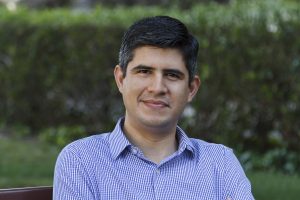
The Chemistry Department welcomes Professor Carlos Jiménez-Hoyos to the faculty as a computational chemist. He earned a BS in Chemistry from Monterrey Tech in Monterrey, Mexico and a PhD in Chemistry from Rice University, working under Gustavo Scuseria in developing computationally efficient methods to describe molecules and materials that are strongly correlated. He then moved to work with Garnet Chan at Princeton University and the California Institute of Technology as a postdoctoral scholar. There he worked, among other things, on the development of embedding methods for practical quantum chemical calculations.
At Wesleyan Prof. Jiménez-Hoyos plans to continue his work on the development of efficient, scalable methods for electronic structure to investigate chemical and physical properties on systems beyond the reach of current techniques. He is very interested in strongly correlated molecules and materials, such as molecular magnets and bioinorganic clusters. In addition, he aims to improve current computation approaches for studying heterogeneous catalysis at transition metal surfaces or nanoparticles, for which he plans to continue his work with embedding techniques. Lastly, Prof. Jiménez-Hoyos is interested in understanding the nature of delocalized excitations in molecular aggregates.
Prof. Jiménez-Hoyos will be offering the following courses in the near future: Thermodynamics, Statistical Mechanics, and Kinetics (CHEM 338) and Intro to Quantum Chemistry (CHEM 340). He will also be a major contributor to our initiative to restructure the Introductory Chemistry Laboratory (CHEM 152).
Recent Retirements
Among the biggest recent changes in the Chemistry Department is the advancement of several of our faculty to emeritus status over the last few years. The department wishes them well on their new adventures.
 |
Wallace (“Pete”) Pringle retired in 2012 after 43 years at Wesleyan. He divides his time between Connecticut and Florida. When he’s in the state, Pete can frequently be found around Hall-Atwater, where he still collaborates with Stew Novick’s group. |
 |
Phil Bolton became emeritus in 2016 and still resides in West Hartford where he is devoting more time to his horticultural interests and going on hikes with his dog, Daphne. |
 |
Also retiring in 2016, George Petersson has relocated to the Philadelphia area where he still stays scientifically active as a Distinguished Adjunct Professor of Chemistry at Temple University. |
 |
Rex Pratt became emeritus at the beginning of 2017 and has returned to Melbourne, Australia, quickly becoming an expert on the local pub culture and enjoying watching a lot more international cricket. |
 |
David Beveridge has simply moved across Lawn Avenue to assume the co-directorship of the Wasch Center for Retired Faculty. |
 |
Al Fry, who officially retired in Jan 2017, is still an active presence in the department and has no plans to do anything else until his current group of undergraduate and master students, has graduated. |

